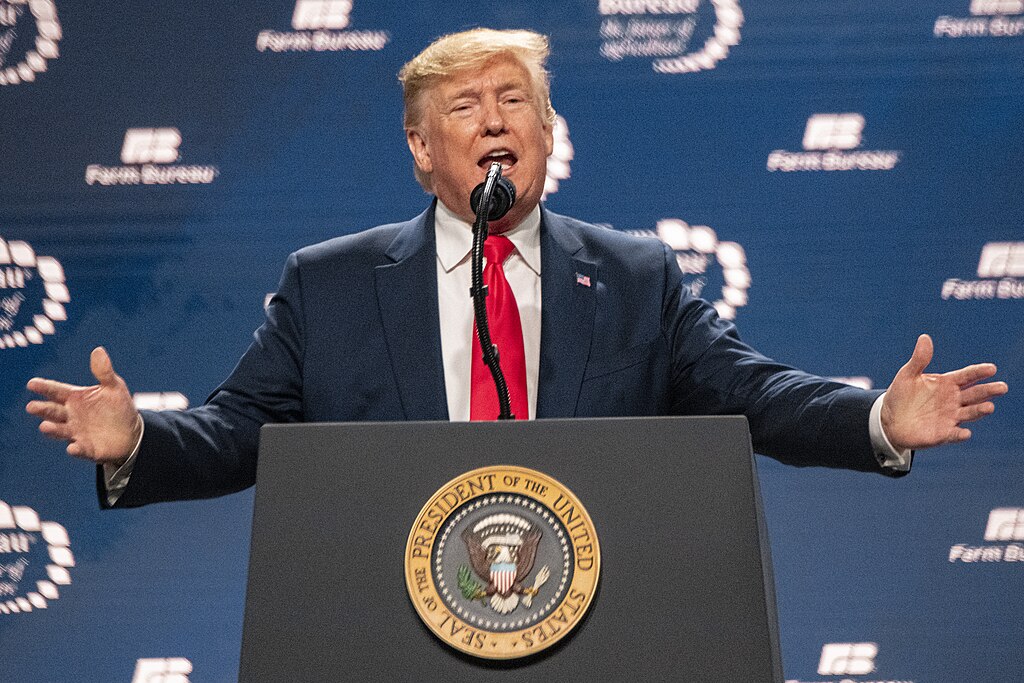Former President Donald Trump has stirred controversy with a proposal to lift U.S. sanctions on Russia and Iran, arguing that these economic penalties are weakening the U.S. dollar and harming America’s global financial standing. The suggestion comes as Trump positions himself for a potential 2024 presidential run, reviving many of his past foreign policy stances and raising questions about how such a move would impact both the U.S. economy and its foreign relations.
Trump’s call to remove sanctions centers on the belief that economic restrictions placed on adversarial nations are having unintended consequences, particularly for the U.S. currency. The former president contends that the sanctions, imposed as part of long-standing U.S. policy to curtail the actions of Russia and Iran, have backfired by pushing these countries to seek alternative trade and financial systems. This, in turn, may be reducing demand for the U.S. dollar and weakening its global dominance.
During his presidency, Trump expanded sanctions on both nations, including penalties on Russia following its annexation of Crimea and cyberattacks on the U.S., as well as sanctions on Iran as part of his administration’s withdrawal from the Iran nuclear deal. These sanctions were designed to isolate the two countries economically, restricting their access to international markets and financial institutions.
Now, in a reversal of those earlier policies, Trump suggests that removing these sanctions could revitalize the U.S. dollar and prevent countries like Russia and Iran from deepening their economic partnerships with China and other non-Western allies. The rise of alternative trade systems and currencies, such as Russia’s pivot to the Chinese yuan or Iran’s engagement with cryptocurrencies, has led to concerns about the dollar’s global dominance.
Critics of Trump’s proposal warn that lifting sanctions on adversarial nations could have far-reaching geopolitical consequences. Removing sanctions on Russia, in particular, could be seen as a softening of U.S. opposition to its ongoing military actions in Ukraine and other hostile activities. Similarly, easing sanctions on Iran could undermine efforts to prevent the country from advancing its nuclear program.
Proponents of the sanctions argue that they remain a critical tool in curbing malign activities by these governments and maintaining U.S. leverage in international diplomacy. They contend that the potential damage to the dollar is outweighed by the necessity of holding countries accountable for actions that violate international law or threaten global security.
EconoTimes cannot independently verify the rumor surrounding Trump’s proposal to remove sanctions on Russia and Iran. The statements reflect ongoing political debate and are subject to further clarification.
As the 2024 election cycle heats up, Trump’s stance on sanctions is likely to become a focal point of his foreign policy platform. Whether the removal of economic penalties on Russia and Iran would bolster the U.S. economy or diminish its global influence remains a topic of intense debate among experts, with far-reaching implications for both domestic and international policy.



 Trump Allows Commercial Fishing in Protected New England Waters
Trump Allows Commercial Fishing in Protected New England Waters  Nighttime Shelling Causes Serious Damage in Russia’s Belgorod Region Near Ukraine Border
Nighttime Shelling Causes Serious Damage in Russia’s Belgorod Region Near Ukraine Border  Jack Lang Resigns as Head of Arab World Institute Amid Epstein Controversy
Jack Lang Resigns as Head of Arab World Institute Amid Epstein Controversy  U.S. Lawmakers to Review Unredacted Jeffrey Epstein DOJ Files Starting Monday
U.S. Lawmakers to Review Unredacted Jeffrey Epstein DOJ Files Starting Monday  Trump Backs Nexstar–Tegna Merger Amid Shifting U.S. Media Landscape
Trump Backs Nexstar–Tegna Merger Amid Shifting U.S. Media Landscape  Norway Opens Corruption Probe Into Former PM and Nobel Committee Chair Thorbjoern Jagland Over Epstein Links
Norway Opens Corruption Probe Into Former PM and Nobel Committee Chair Thorbjoern Jagland Over Epstein Links  India–U.S. Interim Trade Pact Cuts Auto Tariffs but Leaves Tesla Out
India–U.S. Interim Trade Pact Cuts Auto Tariffs but Leaves Tesla Out  New York Legalizes Medical Aid in Dying for Terminally Ill Patients
New York Legalizes Medical Aid in Dying for Terminally Ill Patients  US Pushes Ukraine-Russia Peace Talks Before Summer Amid Escalating Attacks
US Pushes Ukraine-Russia Peace Talks Before Summer Amid Escalating Attacks  Iran–U.S. Nuclear Talks in Oman Face Major Hurdles Amid Rising Regional Tensions
Iran–U.S. Nuclear Talks in Oman Face Major Hurdles Amid Rising Regional Tensions  U.S. Announces Additional $6 Million in Humanitarian Aid to Cuba Amid Oil Sanctions and Fuel Shortages
U.S. Announces Additional $6 Million in Humanitarian Aid to Cuba Amid Oil Sanctions and Fuel Shortages  Trump Endorses Japan’s Sanae Takaichi Ahead of Crucial Election Amid Market and China Tensions
Trump Endorses Japan’s Sanae Takaichi Ahead of Crucial Election Amid Market and China Tensions  Japan Election 2026: Sanae Takaichi Poised for Landslide Win Despite Record Snowfall
Japan Election 2026: Sanae Takaichi Poised for Landslide Win Despite Record Snowfall  China Warns US Arms Sales to Taiwan Could Disrupt Trump’s Planned Visit
China Warns US Arms Sales to Taiwan Could Disrupt Trump’s Planned Visit  Netanyahu to Meet Trump in Washington as Iran Nuclear Talks Intensify
Netanyahu to Meet Trump in Washington as Iran Nuclear Talks Intensify  South Korea Assures U.S. on Trade Deal Commitments Amid Tariff Concerns
South Korea Assures U.S. on Trade Deal Commitments Amid Tariff Concerns  Trump Signs “America First Arms Transfer Strategy” to Prioritize U.S. Weapons Sales
Trump Signs “America First Arms Transfer Strategy” to Prioritize U.S. Weapons Sales 































